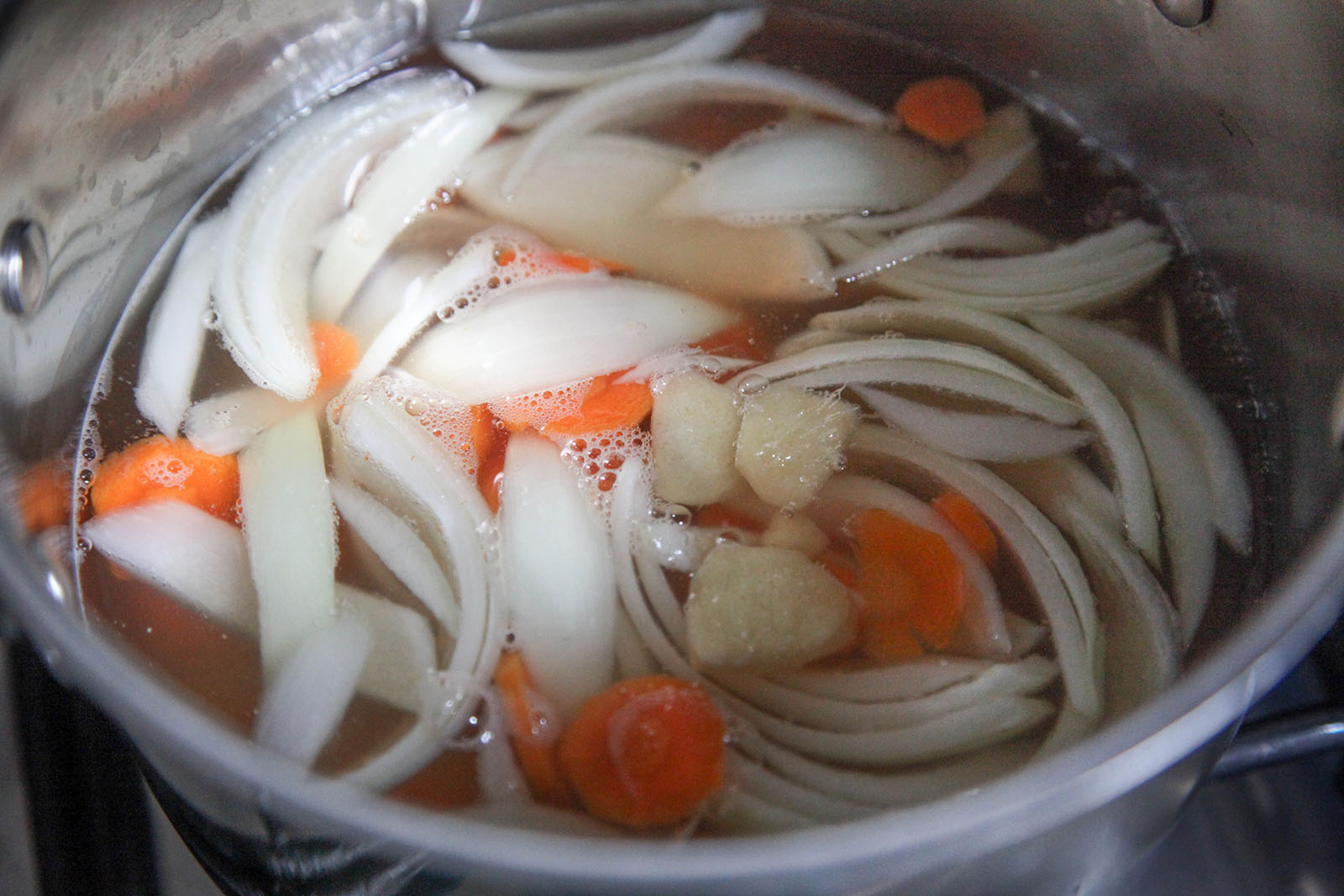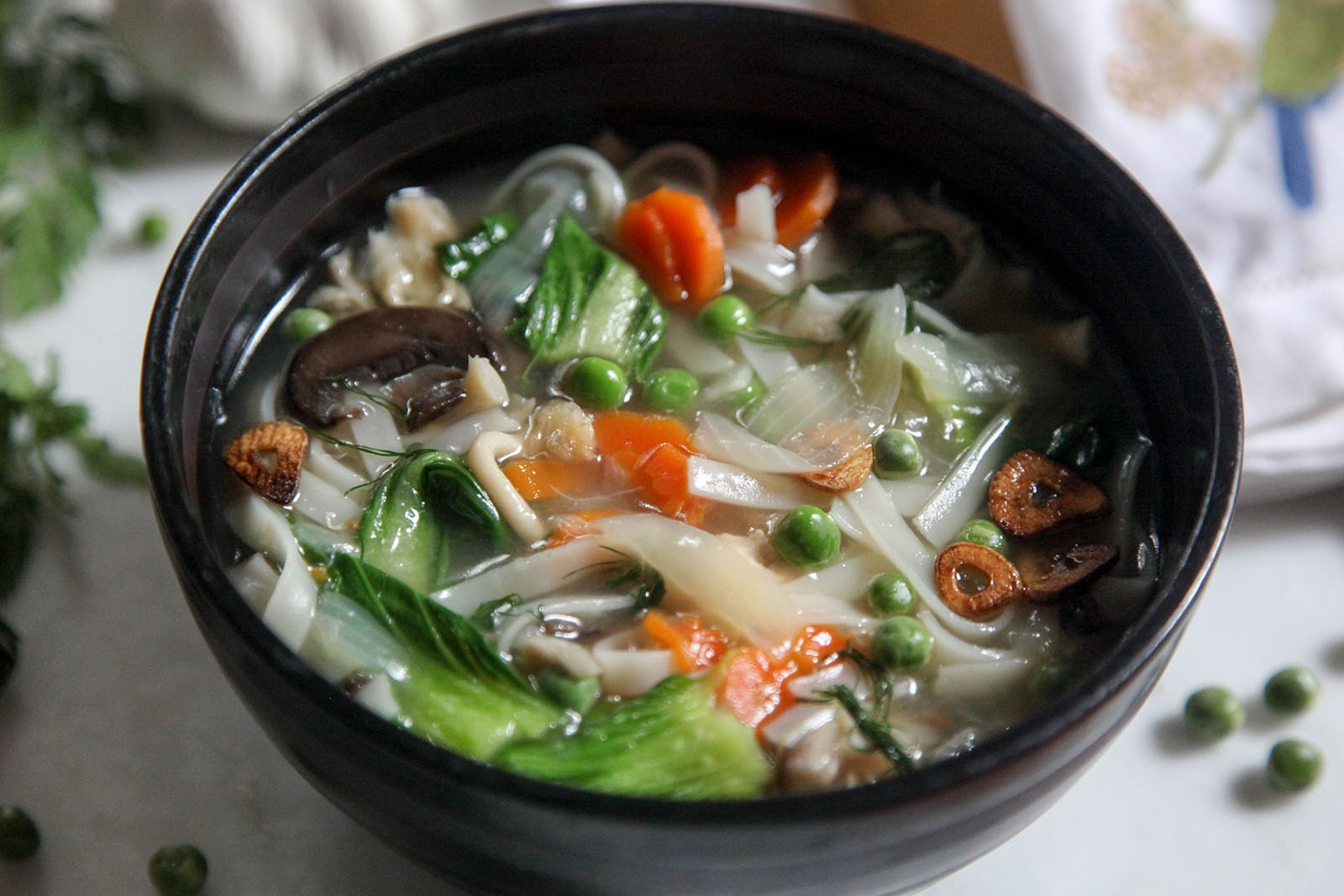Nutritious Chicken Noodle Soup with Vegetables in Bone Broth

When you’re sick, it’s important to eat healthy, nutritious food to help boost your immune system and give your body the strength to fight off illness. The main problem, though? It’s hard to find the energy to cook when you’re feeling awful. I’m often tempted to order in—living in NYC means I’m surrounded by hundreds of restaurants, and it’s incredibly easy to give in. But restaurant food usually isn’t very nutritious, so as tempting as it is, it’s often better to make something wholesome at home.
That’s where a simple, comforting chicken noodle soup with vegetables in bone broth comes in.
This is a basic soup that’s super easy to make, especially when you’re under the weather. I start with nourishing chicken bone broth. While you can make your own using bones, I usually opt for the shortcut during sick days and get mine from a reputable place. I order bone broth from Brodo—they’re close to my apartment, and they also deliver across the US.
To the broth, I add some ginger and onions, a mix of healthy veggies, chicken (for protein), and noodles (for carbs). That’s really all you need.
For an extra layer of flavor—and a little immune boost—I love topping the soup with garlic chips. They add a bit of delicious crunch, and garlic comes with a long list of health benefits. While this recipe follows a specific mix, feel free to use whatever nutritious veggies you have on hand or prefer.
Note:
I originally shared this post during the first wave of COVID in the spring of 2020, after coming down with a very severe case myself (my lung collapsed, among other things). I was lucky to have a wonderful doctor who was actively treating COVID patients in the hospital at the time. Based on their guidance and what early scientific research was showing, I shared what I was doing to support my recovery. The post was widely shared around the world, and I heard from many people who found it helpful.
Now that a few years have passed—and with vaccines available and COVID no longer as frightening as it once was—I’ve decided to revise the post. The original COVID-related details now feel more like a time capsule. So I’ve rewritten it to focus purely on the recipe for this simple, comforting soup.






Nutritious Chicken Noodle Soup with Vegetables in Bone Broth
SERVES: 2
INGREDIENTS
- 2 cups broth (I used Brodo chicken bone broth)
- 2 cups water
- 1 carrot, thin sliced (about 1 cup sliced)
- 1/2 medium yellow onion, thickly sliced
- About 1/4 to 1/2 cup sliced mushrooms (I used crimini and oyster mushrooms)
- 1/2 cup chicken breast, cut into small cubes
- 1 tablespoon fresh ginger, thin sliced
- handful of greens, like bok choy leaves (or can use baby spinach)
- 1/4 – 1/2 cup green peas
- 1/2 cup noodles of choice (I used rice noodles)
- 2 medium cloves garlic, thin sliced
- 1 teaspoon olive oil
- sprig of herb of choice, I used fresh dill
- 1/2 teaspoon salt (if broth is sodium-free)
METHOD
- Add broth and water to a deep pot and bring to a boil.
- Add sliced onion, ginger, carrots. Cook on medium high heat for about 8-10 minutes, until the onion looks translucent and the carrots soften.
- Add chicken pieces and mushrooms, cook for another 3 minutes.
- In the meantime, heat the olive oil in a small pan and fry the garlic slices till light brown and crisp. Remove from oil and set aside.
- Add the noodles to the soup pot and cook for as long as directed, till soft. In the last minute, add bok choy leaves, green peas, dill. Cook for a minute, remove from heat. Check for salt, add if necessary. Transfer to a bowl, add fried garlic slices on top, and enjoy!



I’m an old friend of Chuck’s from NYC (via a Chelmsford connection) and Kaori posted a link to your blog on fb. What an ordeal – happy to hear you’re on the road to recovery and just wanted to say how beautifully written this is. I may even attempt the soup!
Thank you Andrea for your lovely comment! Just showed it to Chuck 🙂 I’ve met a lot of his high-school friends, hope will get to meet you someday too. We saw Kaori & Bill in Japan a few months ago, had an amazing time hanging out with them. Heard you live in Scotland now. My grandfather had been educated in Edinburgh, got his FRCS degree there – so I feel like I have a little bit of family history/connection and hope to visit some day. Let me know if you make the soup – it’s a really easy one!
Ah very good – hope you guys make it here some day, would be lovely to meet you and see Chuck! Edinburgh is a beautiful city and lots to see, make sure if you can to allow some time to see other parts of Scotland, too. We’re also hoping to get to Japan at some point. Haven’t made the soup yet but am bookmarking this now! ♥️
I am so glad that you are on the Road to recovery . Your actions and words are an inspiration to us all. I am lucky living in Australia we have been touched by this disease but no where near as bad as you. I hope you make a full recovery soon, you are always in my prayers.
Veganrodge.
Thank you, I’m truly humbled by your comment. Glad to hear you’re safe, hope you’ll continue to stay well and healthy.
Take care. xo
Very informative and eloquent writing. Loved reading it for the details on how you fought the obnoxious virus. I am sure it will be helpful to a lot of people. Your bravery and mental strength is worth praising. Wish you a happy and long life. Being a school friend of Zarina, you are more than a daughter to me. Love you, Anika
Thank you Aunty, I’m very grateful for your support. Much love to you.